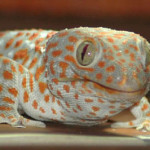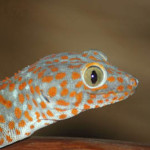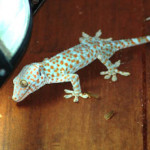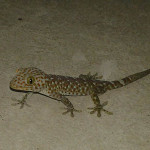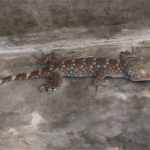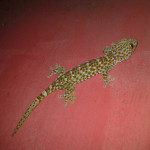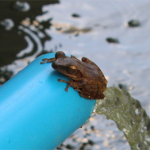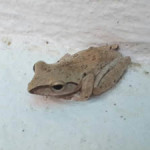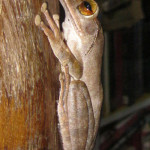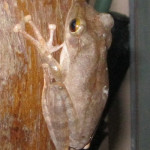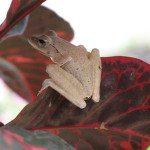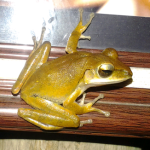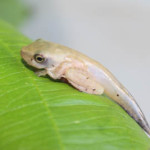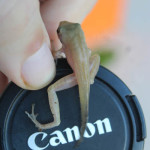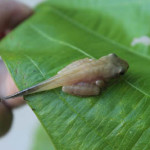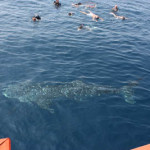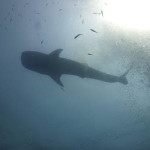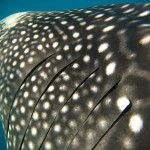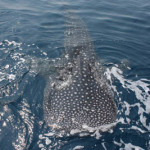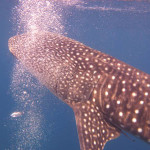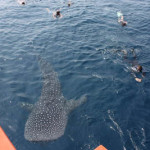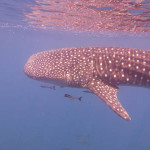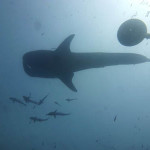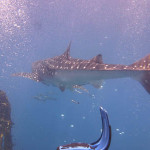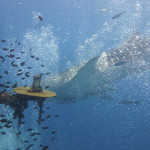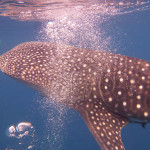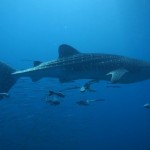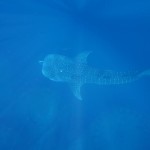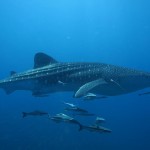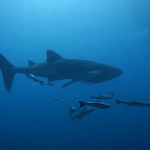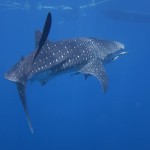Oriental Magpie-Robin (Copsychus saularis)
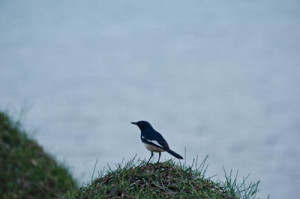
Observed: Koh Chang, February 2015
Observed By: David Vinot
The poor old Oriental magpie-Robin has been the victim of confusion. At first it was thought to be a member of the thrush family but these days it has been classified as an old-world flycatcher, whatever that is. Add to that the fact that it’s called a magpie -Robin because it looks like a robin sized magpie and it’s a grand recipe for confusion.
What we do know, however, is that it is a pretty little black and white bird that lives on Koh Chang.
Oriental Magpie-Robin Wikipedia
Black-Naped Monarch (Hypothymis azurea)
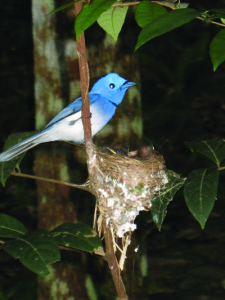 Observed: Koh Chang
Observed: Koh Chang
Observed By: Dave Hinchliffe
The Black-Naped Monarch, aka the Black-Naped Blue flycatcher is a small Koh Chang native bird with a beautiful, almost iridescent, blue plumage. they are tropical forest dwellers and the male of the species has the brighter plumage and the distinctive black nape stripe.
Black-Naped Monarch Wikipedia
Red Junglefowl (Gallus gallus)
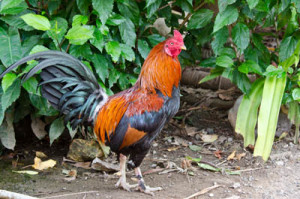 Observed: Koh Chang, February 2015
Observed: Koh Chang, February 2015
Observed By: David Vinot
The Red Junglefowl is the bird that was domesticated as the chicken. Koh Chang has more than its fair share of domestic chickens, as you will be reminded ad nauseum by their fiercely annoying cries at dawn and often before. Some of them are wild or only in semi-captivity, roaming all over the place staring at you with their funny eyes protruding from their horrid novelty condom heads. So whether this counts as a native species or not there are certainly an awful lot of them on Koh Chang.
Eggs are useful though and chicken tastes good.
Red Junglefowl Wikipedia
Red Collared Dove (Streptopelia tranquebarica)
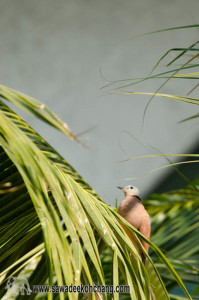
Observed: Koh Chang, February 2015
Observed By: David Vinot
The Red Collared Dove, aqlso known as the Red Turtle Dove, is a member of the pigeon family but with it’s elegant pinkish feathers it seems a very long way from the thuggish, scruffy, streetwise pigeons that blight many towns and cities.
Red Collared Dove Wikipedia
White-Lipped Pit Viper (Trimeresurus albolabris)
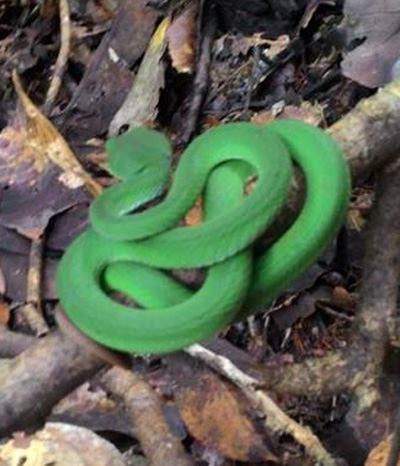
Image Copyright 2015 Teerasak Thomas Suamcheepmasau
Last Observed: November 2015, Koh Chang
Observed By: Teerasak Thomas Suamcheepmasau, Paul Mann, Jean-Pierre Odet
The White-Lipped Pit Viper is a brilliant emerald green species of poisonous snake that is native to Southeast Asia. The aren’t too big, growing to a maximum length of 81cm, but that’s big enough when you’ve got poison. They aren’t a threatened species nor are they a particularly threatening one and they’ll be happy to leave you alone if you return the favour.
White-Lipped Pit Viper Wikipedia
Image Copyright Paul Mann
Image Copyright Jean-Pierre Odet
Image Copyright Jean-Pierre Odet
Image Copyright Teerasak Thomas Suamcheepmasau
Tokay Gecko (Gekko Gekko)
Last Observed: October 2015, Lonely Beach, Koh Chang
Observed By: David Newman
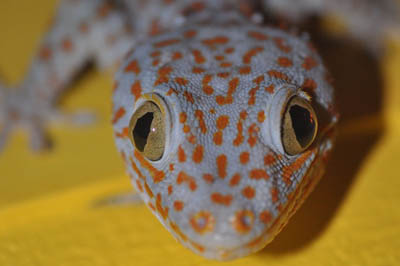
Image Copyright 2015 David Newman
The Tokay Gecko is a large and aggresive lizard common across Southern and Southeast Asia. It is an fierce predator and noted for it’s loud and repetitive cries which, whilst in English are recorded Ge-Ko Ge-Ko, also are the root of the Thai name Too-Kare Too-Kare (both are onomatopoeic names – named after the sound they make).
They are very attractive creatures with their characteristic orange spotted skin. But they are almost universally reviled and demonized by the Thais, many of whom have an almost phobic reaction to them. This seems strange to non-Thais, especially in a country with no shortage of poisonous and dangerous snakes, spiders, insects, scorpions, centipedes and marine animals. Not to mention tigers. But it seems to be the Gecko that is the Thai’s most feared beast. They certainly aren’t afraid of people and I guess they would give you a bit of a bite if you really went looking for it but they have all kinds of good qualities as well. For a start they eat cockroaches, mosquitoes and all kinds of other insects, protecting people from bites, stings and disease. And they sound, and look, pretty cool.
They are the second largest species of Gecko and males can reach 51cm, that’s a pretty big lizard. The males are very territorial and a fight between two of them is a thing to see.
Tokay Lizard Wikipedia
Image Copyright 2015 David Newman
Image Copyright 2015 David Newman
Image Copyright 2015 David Newman
Red Lionfish (Pterois volitans)
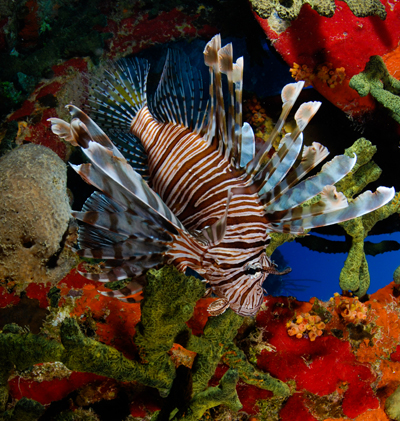
Image Copyright Jonathan Milnes
Observed: Koh Chang Waters
Observed By: Jonathan Milnes
The Red Lionfish is a colourful member of the scorpion fish family that has an array of venomous spines running down its back. Adults can grow as large as 47cm and live up to ten years. Their poison spines are used for protection only. They are rarely fatal to humans but cause extreme pain.
A common treatment is is to soak the stung area in hot water.
Red Lionfish Wikipedia
Bluespotted Ribbontail Ray (Taeniura lymma)
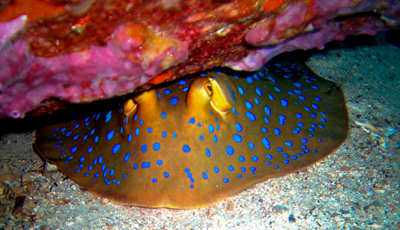
Image Copyright Jonathan Milnes
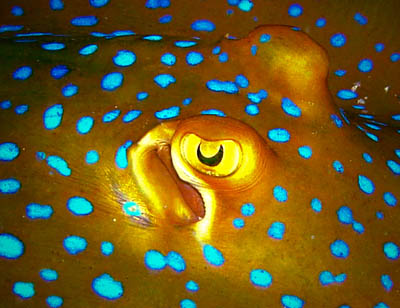
Image Copyright Jonathan Milnes
Observed: Koh Chang Reefs,
Observed By: Jonathan Milnes
The Bluespotted Ribbontail Ray is a beautiful reef-dwelling fish found in the waters around Koh Chang. It is a relatively small ray that doesn’t exceed 35cm in width. It’s poisonous tail spines are able to injure people but it is atimid creature and far more likely to swim away or hide than attack.
Bluespotted Ribbontail Ray Wikipedia
Golden Tree Frog (Polypedates sp.)
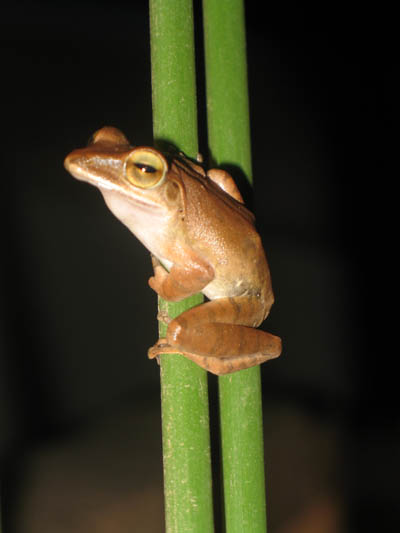
Image Copyright David Hinchliffe
Last Observed: November 2015, Klong Son, Koh Chang
Observed By: Perry Stevens, Dave Hinchliffe, Tijl Adriean
Okay this is a bit of a cheat. You see there are lots and lots of different tree frogs. We know that the ones pictured are in a family of tree frogs known as Whipping Frogs and are native to East, South and Southeast Asia. But it’s hellish difficult to tell the devils apart. Species identification isn’t a learning curve, it’s a learning cliff.
Anyway if there are any herpetologists out there (experts on amphibians and reptiles, in case you were wondering) then please help us improve our definitions down to indivivual species. In the meantime rest assured that Koh Chang has tree frogs, loads of ’em.
Polypedates Frog Wikipedia
Image Copyright Perry Stevens
Image Copright Perry Stevens
Image Copyright David Hinchliffe
Image Copyright David Hinchliffe
Image Copyrigh Tijl Adriaen
Image Copyright Perry Stevens
Image Copyright Perry Stevens
Image Copyright Perry Stevens
Whale Shark (Rhincodon typus)
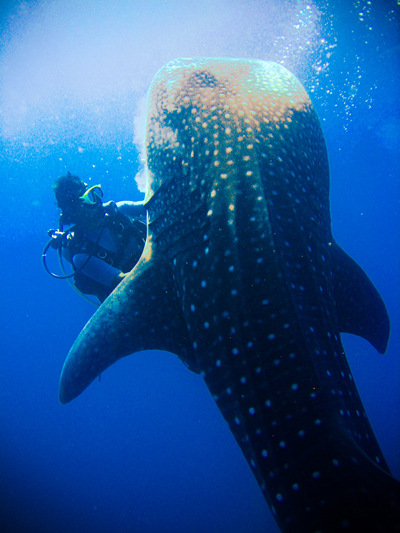
Image Copyright Jonathan Milnes
Last Observed: 2015, Koh Chang
Observed By: BB Divers, Jonathan Milnes, Karin Golsteyn
The Whale Shark is Koh Chang’s biggest visitor by quite some margin. This gentle giant is frequently found in koh Chang waters and a Whale Shark encounter is a unique diving experience. Generally juvenile animals are found in thes ewaters, they are typically (only!) 6-8 metres long. The best way to find out of any recent sightings is to contact the local dive schools on Koh Chang who will be able to tell you.
Whale Shark Koh Chang Guide
Whale Shark Wikipedia
Image Copyright BB Divers
Image Copyright BB Divers
Image Copyright Jonathan Milnes
Image Copyright BB Divers
Image Copyright BB Divers
Image Copyright BB Divers
Image Copyright BB Divers
Image Copyright BB Divers
Image Copyright BB Divers
Image Copyright BB Divers
Image Copyright BB Divers
Image Copyright Karin Golsteyn
Image Copyright Karin Golsteyn
Image Copyright Karin Golsteyn
Image Copyright Karin Golsteyn
Image Copyright Karin Golsteyn











